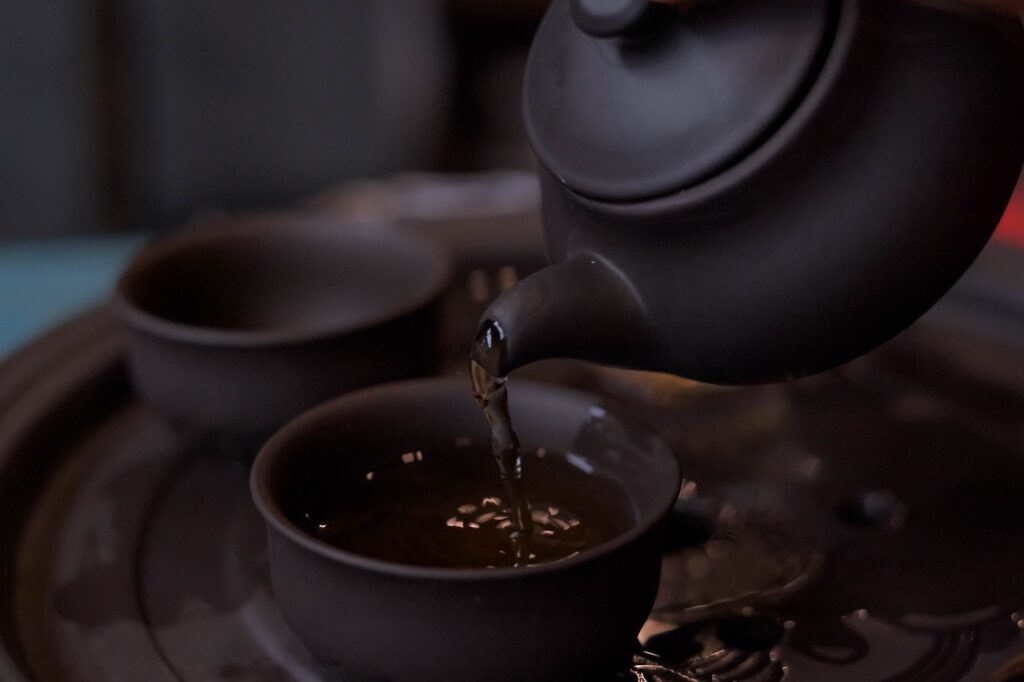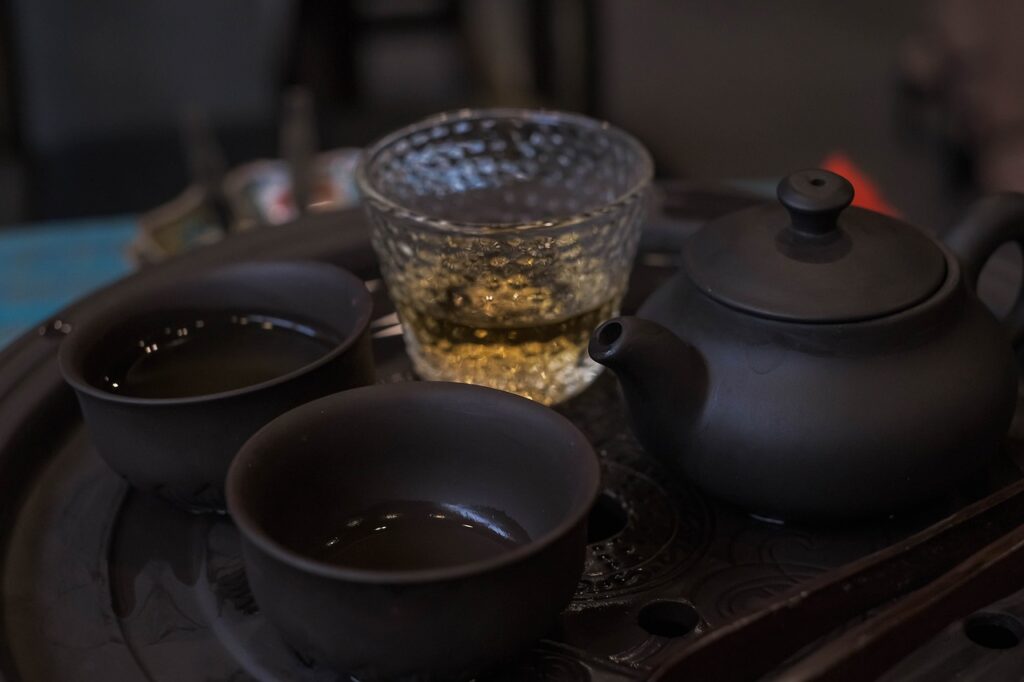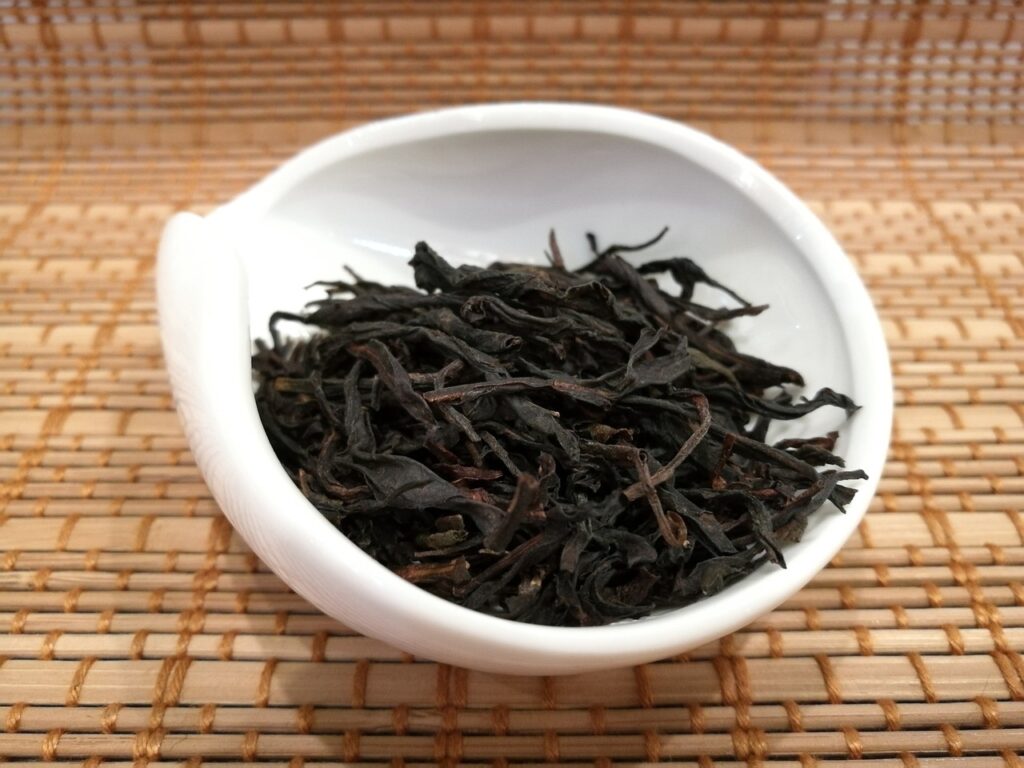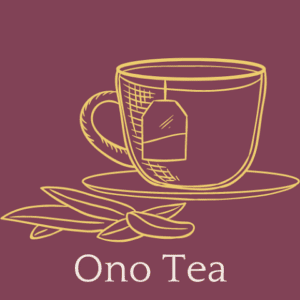In case you don’t know, oolong tea bags are a well-known staple. And why not? These special packaging cubes have the heat and zest of black tea combined with the beneficial properties of green tea. Talk about the optimal amalgamation of tastes. So yes! With this tea, you are sure to get seemingly endless vitamins and minerals in each brewed bag. So, you can bet that sipping just one cup brings unknowable healthful resources sure to nourish both body and mind alike!
What’s more, this tea is sought-after for managing one’s weight and ensuring tranquility and comfort. It is also your go-to tea if you are struggling with obesity. Why? Consuming oolong tea stimulates fat oxidation in the body, helping you shed those extra pounds. In fact, adding oolong tea to your diet plan would prove most beneficial. But you may be wondering if oolong tea, with its bounty of positive effects, has any repercussions. Well. Let’s find out, shall we? But first, let’s see how oolong diet tea is made.
What Is Oolong Tea?
Oolong tea is extracted from the Camellia sinensis plant. It is a traditional Chinese tea that has grown in popularity all over the world.
The various colors of oolong tea originate from the production process. If you want environment-friendly black or oolong tea, it is all in the oxidation process.
Environment-friendly tea is refined from freshly picked fallen leaves that have not gone through the oxidation procedure. Oxidation begins when you expose the leaves to the air. The oxidation process is responsible for the taste and aroma of green tea.
To get black tea, the tea leaves are crushed and left in the sun for a while. Squashing the fallen leaves will enhance oxidation and also guarantee that air reaches all parts of the tea leaves.
Does Oolong Tea Promote Weight Loss?
Over several centuries, tea consumption has been tied to weight loss. Several studies suggest that oolong tea contains bioactive compounds that reduce your chances of gaining weight.
Oolong tea helps with fat oxidation, which is directly responsible for weight loss. Drinking oolong tea not only helps you lose weight but also prevents future weight gain. As long as you keep drinking oolong tea, your weight will be on the right side of the line. Oolong tea promotes weight loss by inhibiting enzymes and increasing your body’s energy expenditure.

What Are the Health Benefits of Oolong Tea?
Oolong tea has been around for generations. Thus, as you would expect, there is a lot of speculation about the health benefits of this Chinese tea. It is very easy for anyone to get confused while trying to understand what oolong tea can do, especially since there is a lot of speculation about its health benefits. However, in this section, you will learn the real benefits you stand to enjoy when you drink oolong tea.
Tooth and Bone Strength
Oolong tea contains antioxidants that help improve the strength of your teeth and bones. People who drink green and black tea have better bone mineral density. To enjoy this benefit, however, you need to have consumed oolong tea for over ten years.
Having a high mineral bone density does not only strengthen your bones. It also lowers the risk of your bones fracturing. Hence, protecting you in your old age, when your bones become extremely fragile—aside from that, you also have stronger dentition.
Eczema
Green and black tea have quickly risen in the world of science because of their ability to relieve symptoms of eczema. If you notice symptoms of eczema in your body, consume either green or black tea. You should begin to notice some improvement as early as two weeks or even less.
How to Prepare Oolong Tea
Oolong tea refers to any partially oxidized tea. The tea falls between fully fermented black tea and partially fermented green tea. You do not need a master’s degree to properly prepare your oolong tea. The best part of preparing oolong tea is that you do not have to break your daily routine or habits to do it.
Hence, I will provide you with a step-by-step process you can use to prepare your oolong tea:
Step 1: Choose Your Tea Set
A ceramic teapot and cup will do nicely for this task. It will provide you with a lovely drinking experience. But if you do not have that readily available, you can use an infuser. Put the infuser in your cup and brew a single serving directly.
If you are opting for an infuser, I suggest you use a large cup so the oolong leaves can properly expand.
Step 2: Put Loose-Leaf Tea in the Cup or Teapot
If you want the best oolong tea experience, do not go for tea bags. The best oolong tea is rarely sold in tea bags. I suggest you look for loose-leaf oolong. The amount you put in your tea is up to your preference.
Step 3: Fill Your Kettle With Water
You can either use distilled or tap water. Both work just fine. But if you are looking for the pure taste of oolong tea, I suggest you use distilled water. Tap water contains chlorine and other impurities that interfere with the taste of the tea.
Step 4: Heat Your Water to 185-205 Degrees Fahrenheit
This temperature is the best for brewing oolong tea. The heat extracts the delicate aromatic chemicals in the tea without breaking them down. If your kettle does not have a thermostat, just watch the water surface for large bubbles that rise to the surface.
Step 5: Rinse the Tea With Hot Water
Pour a little hot water onto your leaves and drain them immediately without losing any leaves.
Step 6: Fill the Container and Steep the Tea
Proceed to fill the container with enough hot water. Allow the tea to steep for two to five minutes, depending on the caffeine content you want in your tea.
You can now enjoy your oolong tea and appreciate the bright color of the tea.
Does Oolong Tea Contain Caffeine?
A simple cup of tea can make a world of difference. One must be mindful in their selection of what goes into their own body. Taking this to heart, I delved further into the wonders and possibilities of oolong tea. Ponder no more; we have the answer for you here if you were wondering whether or not it has caffeine in it!
Absolutely, oolong tea leaves contain caffeine, yet it’s tricky to ascertain an exact quantity. When studying this topic, I noticed varied perspectives on the caffeine content of oolong tea across various blogs and reviews. But then, multiple variables can influence its caffeinated result! Thus, no commentator is amiss because every experimenter tested the potency of this elixir under distinct stipulations.
Naturally, with oolong tea, there’s great variation in its caffeine level due to a variety of sources, the first and foremost certainly being the growing conditions of the leaves. Even so, you are not limited by this factor; the temperature of the water you use to brew your teabags as well as the time steeped can be just as instrumental! So much involved when it comes to getting that perfect cup.
Hey, you must be under the impression that the timing of your oolong tea leaves harvest has no relationship to the caffeinated content of your cup. Well, let me enlighten you otherwise! Research demonstrates a concrete tie between when it is plucked and how much kick your brew gets. Here are five factors that can affect the caffeine content of your Oolong tea
- Water temperature
- The time of year your oolong tea leaves were harvested
- Sleeping time
- Method of processing the tea
- The number of times you brewed oolong tea

Does Black Tea Have More Caffeine Than Oolong Tea?
During my research, I found out that the caffeine content in oolong tea falls between black tea and green tea. Among them all, black tea has the highest caffeine content.
Oolong tea has a range of 10 to 102 mg of caffeine per cup. However, oolong tea maxes out at 102 mg. On the other hand, black tea has as much as 45 to 70 mg per cup. The least is green tea. Green tea has a caffeine content that is constantly lower than 45 mg. If you need a scale to compare, coffee has about 90 to 110 mg of caffeine per cup.
What Does Steeping Have to Do With the Caffeine Level in Oolong Tea?
If you did not know already, steeping is the process tea enthusiasts use to extract the flavor of a tea. Additionally, it also helps tea enthusiasts enjoy the health benefits of any tea. Steeping tea ensures you enjoy the full benefits of your tea bag if you do it right.
So, in this section, we will analyze why steeping affects your caffeine levels so much.
Water Temperature
Ah yes, the critical temperature when trying to get your tea just right is a big deal. You must remember this: as you raise the thermostat of that water, so too will the levels of caffeine in your cup! A minor miscalculation can yield major consequences, and all it takes is a tweak here or there for an entirely new outcome.
Accordingly, a higher temperature of 278 degrees Fahrenheit in brewing tea is likely to correspond with greater levels of caffeine than if you kept the water temperature at 75. In other words, to decrease the amount of caffeine in your beverage, it’s sensible to reduce the heat.
Steeping Time
Let’s consider the complexity of oolong tea: its caffeine content is not just bound to water temperature but also how long you steep it. Soak it for too few minutes, and your cup won’t have enough taste; let it linger a tad longer, and its caffeine strength will skyrocket! Remember, when brewing with intent, time matters.
Assuming a potent pot of tea is in your perspective, steeping oolong for up to five minutes will yield a cup with higher caffeine. However, those seeking subtlety should look no further than sixty seconds or fewer per infusion, as the type of leaves used can also indicate the levels included. Interesting, right?
Number of Times You Brew Your Oolong Tea
Ah, oolong tea! From the first steeping to subsequent infusions, it’s a journey in flavor and complexity. While many people happily brew their tea numerous times – which is perfectly valid by all means–one must consider that the amount of caffeine can fluctuate. To up your caffeine level or quell its buzz, keep an eye on those pots and kettles: The inaugural cup has potency but tapers off as you steep again, so if your preference runs either way, heed how often you go for seconds and refill responsibly!
For those who seek to reduce their caffeine intake while maintaining a flavorful cup of tea, an effortless infusion may be the best option; simply brewing the leaves for just a few seconds and discarding them is enough to achieve a notable difference. Not only does this decrease any bitterness from high levels of caffeine, but it also assures that each subsequent steep will be enjoyed with satisfaction and grace.
What Type of Oolong Tea Has the Most Caffeine Level?
Although we have several oolong varieties on the market, two primary factors are responsible for the caffeine content in your tea. The time of year in which your tea is harvested has a major role to play in all this.
If your tea was harvested during spring or winter, it will have less caffeine content. On the other hand, if your tea leaves were harvested during the summer or fall, expect a truckload of caffeine. This might not hold for every variety. But most varieties follow this little trend. The other factor responsible for the caffeine level in tea is the method of production. If your tea is roasted during processing, it will have less caffeine content. Thus, you should take note of the production process if you want to watch your caffeine intake.

Can Oolong Tea Bags Improve Brain Function?
Oolong tea is a veritable fountain of youth, supplying the brain with beneficial nutrients! According to research, this miraculous beverage promotes healthy neurological capacity not only by helping maintain memory retention but also by guarding against cognitive decline. The high caffeine content packs a bonus: it stimulates our already buzzing brains and allows for the release of dopamine and norepinephrine, which in turn ameliorate moods and focus attention! What’s more, every sip can feel like sipping on wisdom itself.
Intrigued by the promise of better brain activity? Consider the evidence: amino acids like theanine have reportedly been known to reduce stress and heighten alertness. Not to mention, daily consumption of oolong tea may just be your ticket away from cognitive decline. You’re in luck; it doesn’t matter whether you prefer green or black oolong; both offer an entire host of amazing rewards!
Oolong Tea Side Effects
Oolong tea has always been enjoyed for its amazing health benefits and lack of risks, a beverage tradition that the Chinese have maintained over centuries. Though it’s true that oolong does contain some caffeine, if you’re not in favor of its energizing effects, there are ways to reduce the content.
Taking copious amounts of oolong tea can contribute to an increase in pro-oxidants within your body. However, this growth cannot simply be attributed to oolong. Consequently, it is necessary to consider other potential causes as well.
Conclusion
Indeed, when it comes to tea and its health benefits, factoring in oolong is a must. After all, while not as recognized as others, such as black or green varieties, oolong also has properties that are essential for overall well-being! Linked to cardiovascular protection and aiding with oral hygiene, this tasty wonder of nature goes further by introducing molecules known to shield from Type 2 diabetes. Ahh, how magnificent it is indeed!
It’s hard to comprehend, but oolong tea can indeed shield you from certain types of cancer cells. More important than that, though, is its capacity for weight loss. This explains why so many people incorporate this beverage into their diets; they desire the slimming effects. Meanwhile, introducing oolong in powder form—which is readily available in tea bags—addresses any concerns about high caffeine intake compared to coffee and makes it an ideal choice for those less enthused by a large dose of stimulants.

